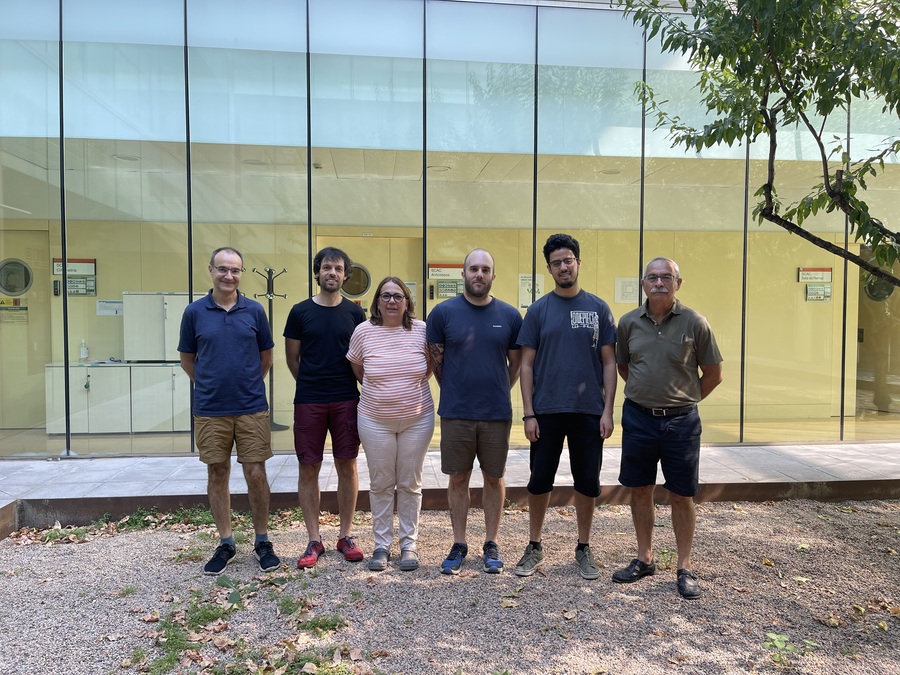Yeast Molecular Biology
Research Lines
Our group is interested in several topics related to the biochemistry, molecular biology and genomics of yeasts, mainly Saccharomyces cerevisiae and Komagataella phaffii (formerly known as Pichia pastoris), specifically those related to cell signaling through protein phospho-dephosphorylation events. To this end, we investigate the molecular mechanisms underlying stress responses, both at the transcriptional and translational levels, and how these mechanisms can be exploited to develop new protein expression platforms of industrial or biomedical interest.
Alkaline pH responses are broadly regulated by phosphorylation mechanisms that profoundly affect transcription. Combining genetic techniques with classical and molecular biochemistry, we have previously characterized in S. cerevisiae the role of several protein phosphatases, such as calcineurin, PP1, Ppz1 or members of the PP2C family in these processes. Our group has been key in understanding the complex signaling network underlying the potent transcriptional remodeling induced by alkaline pH, which involves protein kinases (such as PKA, Snf1/AMPK, Slt2 or Pho85), protein phosphatases (such as calcineurin) and a multitude of transcription factors.
Protein levels do not always correspond to the levels of the mRNAs that encode them, indicating the existence of translational control. The importance of this regulation increases under certain conditions, such as cellular stress, which require immediate changes in protein levels. Using ribosome footprinting sequencing and proteomics techniques, we study the effect of alkaline pH on the regulation of translation and develop translation optimization strategies to increase protein production.
Currently, many proteins of industrial or biomedical interest are produced in yeasts through the process of heterologous expression. We are developing new platforms for heterologous expression of proteins in S. cerevisiae and K. phaffii, based on transcriptional elements activated by moderate alkalization. These platforms can improve currently used production processes.
Information of interest
Design of new synthetic systems for the expression of recombinant proteins induced by alkaline pH in yeast. Proyectos de I+D+i - RTI Tipo B (Ref. PID2020-113319RB-I00). Execution: 1/9/2021-31/12/2024.
Novel methanol free, ph inducible alternatives to produce industrially relevant recombinant proteins in the yeast pichia pastoris. PRODUCTE (Ref. 2023 PROD 00006). AGAUR, Generalitat de Catalunya. Execution: 1/2/2024 - 31/07/2025.
Synthetic promoters for the expression of recombinant proteins induced by alkaline stress in S. cerevisiae and P. pastoris: design, construction, and testing. PROYECTOS DE GENERACIÓN DE CONOCIMIENTO 2023 (Ref. PID2023-150535OB-I00). Ministerio de Cience e Innovación. Execution: 1/9/2024-31/8/2027.
Calafí C; López-Malo M; Velázquez D; Zhang C; Fernández-Fernández J; Rodríguez-Galán O; de la Cruz J; Ariño J & Casamayor A (2020) Overexpression of budding yeast protein phosphatase Ppz1 impairs translation. Biochim. Biophys. Acta - Mol. Cell Res., 1867, 118727. doi:10.1016/j.bbamcr.2020.118727.
Velázquez, D.; Albacar, M.; Zhang, C.; Calafí, C.; López-Malo, M.; Torres-Torronteras, J.; Martí, R.; Kovalchuk, S.I.; Pinson, B.; Jensen, O.N.; Daignan-Fornier, B.; Casamayor, A.; Ariño, J. (2020) Yeast Ppz1 protein phosphatase toxicity involves the alteration of multiple cellular targets. Sci. Rep., 10, 15613 (1-21).
Calafí, C.; López-Malo, M.; Albacar, M.; Casamayor, A.; Ariño, J. (2020) The N-terminal region of yeast protein phosphatase Ppz1 is a determinant for its toxicity. International Journal of Molecular Sciences. 21, 7733 (1-16). doi:10.3390/ijms21207733
Casamayor, A. & Ariño, J. (2020) Controlling Ser/Thr protein phosphatase PP1 activity and function through interaction with regulatory subunits, in Enzymes – Mechanisms, Dynamics and Inhibition. vol. 122, pp. 231-288 T. Karabencheva-Christova & C.Z. Christov, Eds. Elsevier. doi: 10.1016/bs.apcsb.2020.06.004.
Albacar, M.; Sacka, L.; Calafí, C.; Velázquez, D.; Casamayor, A.; Ariño, J. ; Zimmermannova, O. (2021) The toxic effects of Ppz1 overexpression involve Nha1-mediated deregulation of K+ and H+ homeostasis. Journal of Fungi, 7, 1010. https://doi.org/10.3390/jof7121010
Casamayor, A.; Velázquez, D.; Santolaria , C. Albacar, M.; Rasmussen, M.I.; Højrup, P.; Ariño, J. (2022) Comparative analysis of type 1 and type Z protein phosphatases reveals D615 as a key residue for Ppz1 regulation. International Journal of Molecular Sciences. 23(3):1327. https://doi.org/10.3390/ijms23031327.
Albacar, M.; Velázquez, D.; Casamayor, A. & Ariño, J. (2022) The toxic effects of yeast Ppz1 phosphatase are counteracted by subcellular relocalization mediated by its regulatory subunit Hal3. FEBS Letters. 596(12):1556-1566
Santolaria, C.; Velázquez, D.; Albacar, M.; Casamayor, A. & Ariño, J. (2022) Functional mapping of the N-terminal region of the yeast moonlighting protein Sis2/Hal3 reveals crucial residues for Ppz1 regulation. FEBS J. 289(23), 7500-7518.
Bravo-Alonso, I.; Morin, M.; Arribas-Carreira, L.; Álvarez, M.; Pedrón-Giner, C.; Soletto, L.; Santolaria, C.; Ramón-Maiques, S.; Ugarte, M.; Rodríguez-Pombo, P.; Ariño, J.; Moreno-Pelayo, M.A.; Pérez, B. (2023) Pathogenic variants of the coenzyme A biosynthesis-associated enzyme phosphopantothenoylcysteine decarboxylase (PPCDC) cause autosomal-recessive dilated cardiomyopathy. Journal of Inherited Metabolic Disease. 46(2):261-272. doi: 10.1002/jimd.12584
Albacar, M; Zekhnini, A.; Pérez-Valle, J.; Martínez, J.L., Casamayor, A.; Ariño, J. (2023) Transcriptomic profiling of the yeast Komagataella phaffii in response to environmental alkalinization. Microbial Cell Factories. 22(1):63. doi: 10.1186/s12934-023-02074-6.
Zekhnini, A.; Albacar, M.; Casamayor, A.; Ariño, J. The ENA1 Na+-ATPase Gene Is Regulated by the SPS Sensing Pathway and the Stp1/Stp2 Transcription Factors. Int. J. Mol. Sci. 2023, 24, 5548. https://doi.org/10.3390/ijms24065548.
Albacar, M.; Casamayor, A.; Ariño, J. Harnessing alkaline-pH regulatable promoters for efficient methanol-free expression of enzymes of industrial interest in Komagataella phaffii. Microbial Cell Factories, 2024, 23. 99.
Funding
Other links of interest
Additional information






